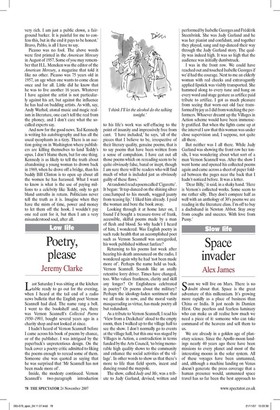Poetry, Please
Jeremy Clarke Tast Saturday I was sitting at the kitchen table ready to go out for the evening, when I heard at the tail end of a radio news bulletin that the English poet Vernon Scannell had died. The name rang a bell. I went to the bookshelf and, yes, there was Vernon Scannell's Collected Poems 1950-1993, bought several years ago in a charity shop and not looked at since.
I hadn't heard of Vernon Scannell before I came across his book of poems by chance, or of the publisher. I was intrigued by the paperback's unpretentious design. On the back cover a poetry critic admitted to liking the poems enough to reread some of them. Someone else was quoted as saying that he was surprised that 'Mr Scannell has not been made more of'.
Inside, the modesty continued. Vernon Scannell's two-paragraph introduction to his life's work was self-effacing to the point of insanity and impressively free from cant. 'I have included,' he says, 'all of the pieces that I believe to be, irrespective of their literary quality, genuine poems, that is to say poems that have been written from a sense of compulsion. I have cut out all those poems which on rereading seem to be quite obviously false, banal or inept, though I am sure there will be readers who will find much of what is included just as obviously guilty of these flaws.'
At random Tread a poem called 'Cigarette'. It began: 'It tap-danced on the shining silver case/Jumped to his mouth, wagged jaunty from teasing lip.' I liked him already. I paid the woman and bore the book away.
Looking through it at home later on, I found I'd bought a treasure-trove of frank, accessible, skilful poems made by a man of flesh and blood. So why hadn't I heard of him, I wondered. Was English poetry in such rude health that an accomplished poet such as Vernon Scannell was unregarded, his work published without fanfare?
Returning to his poems last week after hearing his death announced on the radio, I wondered again why he had 'not been made more of'. Perhaps the name held us back. Vernon Scannell. Sounds like an anally retentive lorry driver. Times have changed, too. Who values frankness, clarity and skill any longer? Or Englishness celebrated in poetry? Or poems about the military? Perhaps the ideology-laden sentiment that we all trade in now, and the moral vanity masquerading as virtue, has made poetry all but redundant.
As a tribute to Vernon Scannell, I read his 'View from a Deckchair' aloud to the empty room, then I walked up to the village hall to see the show. I don't normally go to events at the village hall, but this one was staged by Villages in Action, a contradiction in terms funded by the Arts Council, 'to bring memorable high quality shows to the community and enhance the social activities of the village'. In other words to show us that there's more to life than field sports, incest and dancing round the maypole.
The show, called Judy and Me, was a tribute to Judy Garland, devised, written and performed by Isabelle Georges and Frederik Steenbrink. She was Judy Garland and he was her pianist and confidant, and together they played, sang and tap-danced their way through the Judy Garland story. The quality was indeed high. It was so high that the audience was initially dumbstruck.
I was in the front row. We could have reached out and touched Isabelle Georges if we'd had the courage. Next to me an elderly woman with red cheeks and extravagantly applied lipstick was visibly transported. She hummed along to every tune and hung on every word and stage gesture as artifice paid tribute to artifice. I got as much pleasure from seeing that worn-out old face transformed by joy as I did from watching the performers. Whoever dreamt up the Villages in Action scheme would have been immensely gratified. But when the lights came up at the interval I saw that this woman was under close supervision and, I suppose, not quite all there.
But neither was I all there. While Judy Garland was showing the front row her tonsils, I was wondering about what sort of a man Vernon Scannell was. After the show I went home and opened his collected poems again and came across a sheet of paper folded between the pages near the back that I hadn't noticed before. It was a letter.
'Dear Billy,' it said, in a shaky hand. 'Here is Vernon's collected works. Some seem to me rather silly. They don't compare half as well with an anthology of 30's poems we are reading in the literature class. I'm off to buy a dachshund in Newton Abbot. Stay away from coughs and sneezes. With love from Pussy.'






































































 Previous page
Previous page